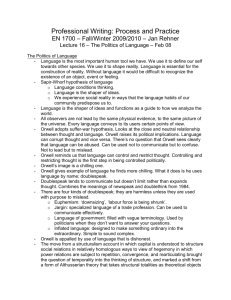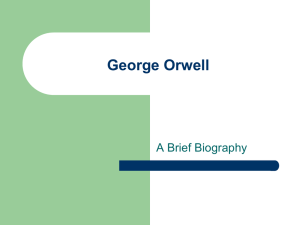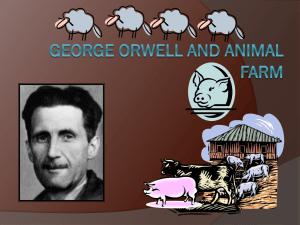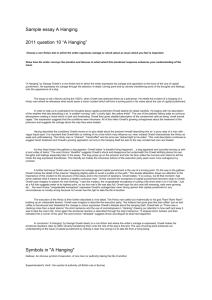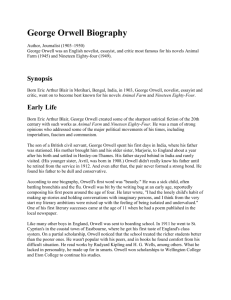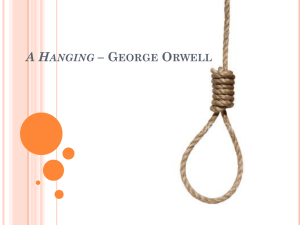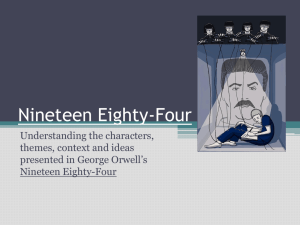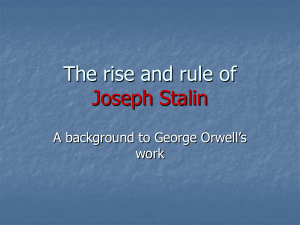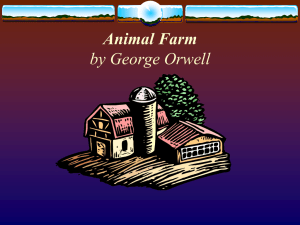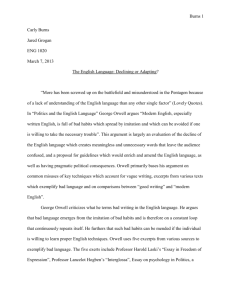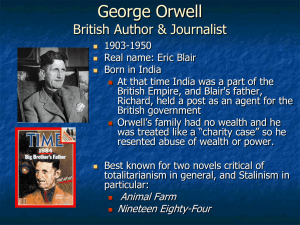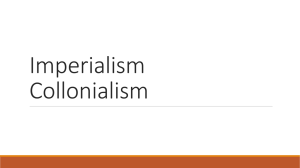Orwell_and_Language
advertisement
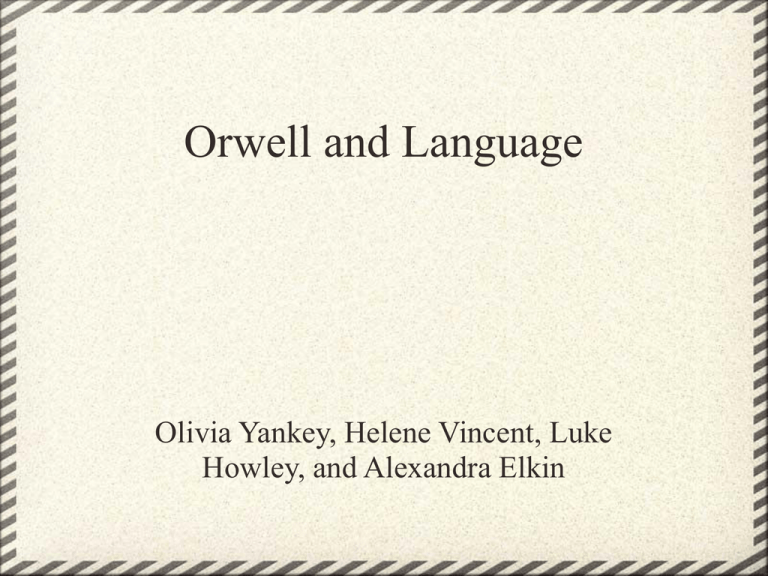
Orwell and Language Olivia Yankey, Helene Vincent, Luke Howley, and Alexandra Elkin “Politics and the English Language” Historical/Political Context: Published in 1946: –WWII had just ended –Churchill delivers his “Iron Curtain” speech at Westminster College –William Joyce executed for anti-British broadcast propaganda –First meeting of the UN Literary Context/Orwell's Life •His wife, Eileen, dies in 1945, just a year after the couple adopted a baby boy •While waiting for publishers to pick up Animal Farm, Orwell works as a war correspondent in Paris for The Observer •Animal Farm is finally published in 1945, garnering fame for Orwell •In 1946, Orwell begins work on 1984 •His own health begins to decline at this time Orwell's Argument •Orwell writes about the bad literary habits and “debased language” of the time, what he saw as a decline in the precision and care with which people wrote. •He suggested that this decline brings with it a negative impact on the overall consciousness of a society. •Cites political and economic causes for this collapse of modern language “But an effect can become a cause…” •Highlighted the dialectical nature of the relationship between language and politics: –“It becomes ugly and inaccurate because our thoughts are foolish, but the slovenliness of our language makes it easier for us to have foolish thoughts.” (p. 270) •Suggested that cleaning up the English language is the first step towards political reorganization – Explains that concern over the state of the language is not a foolish or superficial endeavor The Essay Itself •Selected five passages to illustrate common problems he finds with English as it was then written •All contain a lack of precision and trite imagery •His “catalogue of swindles and perversions”: 1. Dying metaphors 2. Operators/verbal false limbs 3. Pretentious diction 4. Meaningless words His Prescription He offers guidelines to avoid this kind of debased writing (285): •Never use a metaphor, simile, or other figure of speech which you are used to seeing in print. •Never use a long word where a short one will do. •If it is possible to cut a word out, always cut it out. •Never use the passive where you can use the active. •Never use a foreign phrase, a scientific word, or a jargon word if you can think of an everyday English equivalent. •Break any of these rules sooner than say anything outright barbarous. Do as I say, not as I do. •Orwell mentions that he, too, is guilty of writing this way, having probably committed some of these infractions within this very essay. •How does one reconcile his emphatic list of literary “don’ts” with the fact that he knowingly commits them himself? Writing Degree Zero ( Le degré zero de l’écriture) • Roland Barthes (1915-1980) • Written in 1953, translated in 1967 • Barthes first full-length book • Work of literary criticism Language, Style, and Writing Language: the ordered, collective, historical horizon of social experience Style: the residue of a given author's biology (body) and biography (past) Writing (ecriture): the writer's form, the unique and creative act Between language and style, the two predetermined necessities that impose themselves and that the writer may transform but not refuse, writing emerges as the synthesizer The Mode of Writing "A language and a style are blind forces; a mode of writing is an act of historical solidarity. A language and a style are objects; a mode of writing is a function: it is the relationship between creation and society, the literary language transformed by its social finality, form considered as a human intention and thus linked to the great crises of history" (14) In more understandable terms...modes of writing are inextricably linked to socio-historical factors (history shapes mentality and consciousness) and he describes these modes as being chosen by the writer The Author and the Scriptor The Author • The writer as a craftsman "who shuts himself away in some legendary place, like a workman operating at home [...] devoting to his work regular hours of solitary effort" • The lone genius with a kind of power of original imagination • This figure is obsolete The Scriptor • The writer is no longer the focus of creative influence • A figure of the modern world • Has no past, but is born with the text • Lets language speak Realism "No mode of writing was more artificial than that which set out to give the most accurate description of nature" (67) The combination of formal signs of literature (preterite, indirect speech, rythm, etc.) and signs of realism (popular speech, strong language, etc.) does not work well Roger Garaudy Realism is to be found in a neutral form of writing that can "achieve innocence" (Albert Camus- L'etranger) A Zero Degree The concept was actually suggested earlier by Jean-Paul Sartre's expression “L’écriture blanche” A colorless writing: a "style of absence" which transforms itself into a "neutral term or zero element" Deliberately forgoes any elegance or ornamentation "[Entrust] one's fate to a sort of basic speech" (77) The goal is to be able to write without style and convey the realities of society “Writing is then reduced to a sort of negative mood in which the social or mythical characters of a language are abolished in favour of a neutral and inert state of form; thus thought remains wholly responsible, without being overlaid by a secondary commitment of form to a history not its own”(77) A Zero Degree Two excerpts from Albert Camus' L'etranger: "Maman died today. Or yesterday maybe, I don't know. I got a telegram from the home: 'Mother deceased. Funeral tomorrow. Faithfully yours.' That doesn't mean anything. Maybe it was yesterday" (Part 1, Chapter 1) "For everything to be consummated, for me to feel less alone, I had only to wish that there be a large crowd of spectators the day of my execution and that they greet me with cries of hate" (Part 2, Chapter 5) The Trouble of a Zero Degree “Unfortunately nothing is more fickle than a colourless writing: Mechanical habits are developed in the very place where freedom existed, a network of set forms hem in more and more the pristine freshness of discourse, a mode of writing appears afresh in lieu of an indefinite language. The writer, taking his place as a ‘classic’, becomes the slavish imitator of his original creation, society demotes his writing to a mere manner, and returns him a prisoner to his own formal myths” (78) Orwell & A Zero Degree Orwell certainly wants to convey the realities of society, but is it the colorless writing Barthes delineates? Are Orwell's novels "artificial" as were the novels of the realist writers like Maupassant and Zola? Stuart Chase and George Orwell Orwell’s Views of Chase: “Stuart Chase and others have come near to claiming that all abstract words are meaningless, and have used this as a pretext for advocating a kind of political quietism. Since you don’t know what Fascism is how can you struggle against Fascism?” (285) Orwell’s Response to Chase: “One need not swallow such absurdities as this, but one ought to recognize that the persistent political chaos is connected with the decay of language, and that one can probably bring about some improvement by starting at the verbal end.” (285) Stuart Chase • 1888-1985 • American economist • 1917: Federal Trade Commission o Investigation of the meatpacking industry • “Consumer Literacy” • 1937: FDR and the New Deal • Post-WWII, Cold War: “Today the citizen can only save his home, and his country, by helping to save mankind.” “[H]e perhaps more than any other one person has made economics interesting and understandable to everyday people like you and me.” -1942 magazine article The Tyranny of Words • Published in 1938, met with great popular success • Semantics o o “Abstract words and phrases without discoverable referents would register a semantic blank, noises without meaning” (Chase 21) Orwell’s meaningless words: “The word fascism has now no meaning except in so far as it signifies ‘something not desirable’” (Orwell 276) • Seeks to repair the vagueness and inconsistency of meaning that result in “bad language” o How can we arrive at a given destination by following a grossly inaccurate map, especially when each adventurer has a map with different inaccuracies? Better language can clear away many nonexistent locations which clutter the maps we now carry” • Praises scientific language as well-developed and in Orwell and The Tyranny of Words • Agreements between Chase and Orwell: o Focus on the relationship between new political developments and linguistic development Orwell: “When the general atmosphere is bad, language must suffer” (282) Chase: “From 1870 to 1914 in the United States this kind of thing did not make so much difference. Men were busy overrunning a continent, and words could not seriously deflect the course of hustling and impetuous action. But those of us who have lived through the Great War, the Great Boom, the Great Depression, and now observe the rise of the dictators abroad are not so easy in our minds as were our fathers…” (351) o “In our age there is no such thing as keeping out of politics” Review of Tyranny: “…The book is not on linguistics, but is a politico-economic tract” (Kent) o Succinct style with effective, easily understandable imagery No “dying metaphors” or “pretentious diction” o Both admit to some lapses in their own works Orwell and The Tyranny of Words • Orwell’s problems with The Tyranny of Words: o Advocates political quietism “Confusions persist because we have no true picture of the world outside, and so cannot talk to one another about how to stop them…If people do not in fact behave as our ideas of ‘fascism’ expect them to behave, we are rendered helpless in dealing with the happenings which go on under that label” (Chase 352) o Chase offers vague advice for changing the system “The promise of the semantic discipline lies in the broadening of the base of agreement” Call to abandon contemporary canons of thought and belief and to Ogden and Orwell Rubin's Outside the Whale
